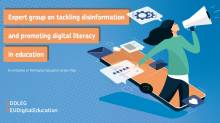
On 13 October, European Commissioner, Mariya Gabriel, officially launched the Commission expert group on tackling disinformation and promoting digital literacy through education and training.
During the next 12 months, the main task of the group will be to assist the Commission in preparing common guidelines for teachers and educators to tackle disinformation and promote digital literacy through education and training.
Kick-off meeting
At the start of the meeting, the co-chairs Georgi Dimitrov, Acting Head of Unit, Digital Education, Directorate-General for Education, Youth, Sport and Culture (DG EAC) and Rehana Schwinninger-Ladak, Head of Unit, Interactive Technologies, Digital for Culture and Education, Directorate-General for Communications Networks, Content and Technology (DG CNECT), welcomed the 25 members of the expert group.
The co-chairs presented to the experts the objectives, mandate of the group and the expected tasks and deliverables, along with the roadmap for the work ahead.
Commissioner Gabriel then welcomed the expert group, sharing the Commission’s expectations of the group to develop common guidelines for teachers and her trust in the work of the experts in the process. The Commissioner also exchanged with the experts on examples of best practices for teachers and educators.
The meeting continued with discussions in smaller groups, where the experts focused on good practices and common denominators for success, focusing on five key themes:
The kick-off meeting was preceded by a press point to mark the launch of the group hosted by Commissioner Gabriel on 12 October. Joined by Divina Frau-Meigs (Savoir Devenir) and Onno Hansen-Staszy?ski (expert in individual capacity) and expert group members , the Commissioner presented the work of the group and addressed questions from journalists.
Next steps
During its 12-month mandate, the expert group will meet four times. The group’s second meeting will take place in late November 2021 and will focus on fine-tuning content for the group’s report.
The two meetings in 2022 (February and June) will then look at the development of the guidelines. The final guidelines for teachers and educators will be published in autumn 2022.
How were group members selected?
The group includes representatives of the education and training community, academia, journalism, public service broadcasting and the technology sector, selected through a call for applications.
Additionally, the United Nations Children's Fund (UNICEF), the Council of Europe, the Organisation for Economic Co-operation and Development (OECD) and the European Union Intellectual Property Office (EUIPO) were invited to join the group due to their prior expertise in the field.
You can learn more about the group and its members on the dedicated page of the Expert group in the Commission Register.
Background
With the Digital Education Action Plan (2021-2027), the Commission presented its strategic view on addressing the impact of the COVID-19 crisis, as well as the long-term digital transformation of education and training systems.
Under its second strategic priority – ‘enhancing digital skills and competences for the digital transition’, the Action Plan seeks to promote digital literacy and to tackle disinformation through education and training by developing common guidelines for teachers and educators.
The Digital Education Action Plan is a key instrument under the Commission’s European Education Area initiative, which outlines its vision for the future of education and training in the EU until 2025 and beyond.
Reference Link:https://ec.europa.eu/education/news/expert-group-tackling-disinformation-promoting-digital-literacy-launched_en